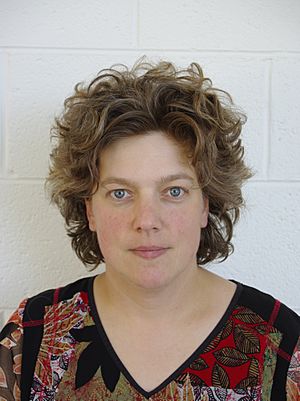Barbara R. Holland facts for kids
Quick facts for kids
Barbara Ruth Holland
|
|
|---|---|
 |
|
| Born | 23 January 1976 |
| Nationality | New Zealander |
| Alma mater | Massey University |
| Known for | Theoretical Phylogenetics |
| Awards | Australian Research Council Future Fellow (2011-2014) |
| Scientific career | |
| Fields | Theoretical Phylogenetics |
| Institutions | University of Tasmania |
| Thesis | Evolutionary analyses of large data sets: Trees and beyond (2001) |
| Doctoral advisor | Michael Hendy David Penny |
Barbara Ruth Holland is a scientist from New Zealand who also works in Australia. She is a Professor of mathematics at the University of Tasmania. Professor Holland is part of a special group that studies how living things are related, called the Theoretical Phylogenetics Group. She also works at the ARC Centre of Excellence for Plant Success in Nature and Agriculture.
Professor Holland has done a lot of important work. She has helped create ways to figure out how different living things are connected. This is done by looking at their DNA and protein information. She has written many scientific articles and given talks around the world. She is also a senior editor for a science magazine called Molecular Biology and Evolution.
Contents
Understanding Life's Connections
Professor Holland is very interested in how all living things are related. This field is called phylogenetics. She also studies mathematical biology, which uses math to understand how living things work. Her work also includes population genetics, which looks at how genes change in groups of animals or plants. She even studies epidemiology, which is about how diseases spread.
Her main goal is to understand how different species evolved from common ancestors. She develops tools to check how well our ideas about these connections match the actual data. Professor Holland helps biologists turn their questions about life into math problems. This way, they can use math to find answers.
Professor Holland's Journey
Professor Holland earned her highest degree, a doctorate, in 2001 from Massey University in New Zealand. Her studies focused on understanding evolution using large amounts of data. Today, she is a mathematics professor at the University of Tasmania in Australia. There, she teaches subjects like statistics and phylogenetics. She is also a key member of the university's Theoretical Phylogenetics Group.
After finishing her doctorate in 2001, Professor Holland worked in Germany for about a year. From 2002 to 2010, she worked at Massey University in New Zealand. She was a Post Doctoral Fellow and then a Research Fellow at the Allan Wilson Centre. She also taught mathematics at the university, becoming a senior lecturer. In 2010, she started teaching mathematics at the University of Tasmania. From 2011 to 2014, she was a Future Fellow at the university. This was a special award from the Australian Research Council.
Organizing Science Meetings
From 2010 to 2014, Professor Holland helped organize a conference called Phylomania. This meeting brought together scientists who study phylogenetics. They worked on big challenges in the field. They also helped develop the math used in studying how living things are related. In 2010, she also led the organization of the New Zealand Phylogenetics Meeting. This meeting took place in Whakapapa Village.
Awards and Recognition
Professor Holland's skills have led to many awards and important roles. She has been a lead researcher on many projects. In 2004, she helped with a project about tiny living things called prokaryotes and eukaryotes. This project received funding from the Marsden program. In 2005, she led another Marsden project. This one looked at how plants evolved using their genetic information.
Also in 2005, she received the Bridge to Employment Grant. This was from the Foundation for Research, Science and Technology (FoRST). She also won the Hamilton Award from the Royal Society of New Zealand. She was invited to a special workshop for young scientists. In 2006, she helped with a project about a type of yeast called Candida albicans. She also received the Early Career Research Medal from Massey University.
Professor Holland has been an editor for the journal Molecular Biology and Evolution. She became an Associate Editor in 2007 and a Senior Editor in 2012. In 2008, she worked at the Allan Wilson Centre. She also received the Early Career Research Award from the New Zealand Mathematical Society. In 2009, she led a Marsden project about understanding complex evolution. In 2010, she received another Future Fellowship from the Australian Research Council.
In 2011, Professor Holland worked on two different projects. One project, funded by a Human Frontier Science Program grant, studied ancient Ibis mummies from Egypt. The other project, funded by an Australian Research Council Linkage grant, looked at how animals might react to climate change. From 2013 to 2016, Professor Holland was elected to serve on the council of the Society of Systematic Biologists.
 | George Robert Carruthers |
 | Patricia Bath |
 | Jan Ernst Matzeliger |
 | Alexander Miles |

